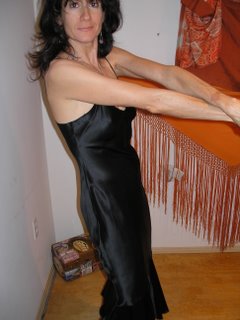Masks

11.10.06
My mother once knew a man who sang with the Metropolitan Opera in New York City. A performance of Salome was done with masks and he gaver her one made by an artist named Benda (sp?). It is the face of a porcelain china doll with white skin, garnet red lips, smooth page boy black hair and thick lashes, but no eyes. Two holes in the mask allow the peformer to see. This luscious face graces the stairwell at my mother's house, where she moved in her 50's, having worn out her time in Greenwich Village. Behind that wax and canvas face lies many mysteries, as did the facade that was my mother's own personna.
A teacher at the Y today shared his experience as a Cuban American actor who's having trouble not being "Latino" or "Caucasion" enough for casting directors. Although he looks hispanic to me, he's not the cariacature dark skinned, mustachio-ed type they're looking for. He shared that he feels lost sometimes not knowing where he belongs, where he fits in. And I wondered how many of us share this dis-ease, despite the fact that we are more a nation of mongrels than pure-breds.
I could relate to this feeling of not quite belonging, especially now in teh work I do. A client had a private meeting with me the other day, concerned that he would not lose enough wieght to qualify for the surgery. We got to talking about some underlying reasons for over-eating and I always share with my clients my own past history so that can know that I can empathize with teh food obsession part of their situations if not the disease and stigmatization of morbid obesity. People have always seen me as tall, slender, seemingly self-sufficient, accomplished, privileged, in short a "type" in itself, which doesn't always fit with my own self-image, so I can relate to feeling cast in a certain role. And being mis-understood when my inability to articulate vulnerability, need, or uncertainty prevails.
What does it mean to be the "Cuban" the "Fatty" the "Sophisticate" the "Debutante"? Why do we need to cast each other into various roles, require them to fulfill certain expectations based on their looks, demeanour or background? Is it handier in a densely populated, diverse, stressful environment to be able to pigeon hole people so we dont' ahve to imagine their complexities? Is it easier to hand a homeless persno a coin, dismissing him as an equal than to sit and listen to his story? Do we engage in these outrageously negative slander campaigns each election cycle because it's much more efficient than sitting down with opposing viewpoints and fleshing them out? Do we give up too easily on difficult relationships because it reinforces our own self beliefs and allows us to stay secure with what we are, never to challenge ourselves to change but casting the other as "at fault." How ironic taht we have "no-fault" divorce, when I suspect it should be more aptly named "joint deposit." I personally think that we are biologically wired to fear, or at least be hesitant to embrace, the other, since racism, and so many other -isms persist to this day. We must be wired to be leary of another other tribe that might steal our woman or our mastadon. How sad that we couldn't be more wired to welcome the stranger for all he/she might teach or share with us.
We wake up each morning and put on our masks, the dutiful husband, the sexy socialite, the power hungry lawyer, the playful performer, the dour bus driver, hiding teh myriad selves who reside within. What prompts us to take off the mask long enough to see what other players we might want to be? When do we feel safe enough to say, "hey, look at me. I am not just what you see, let me show you more." My clients wear the mask of the tormentor, the abuser who shoves food into the deep well of pain that seems never quenched. People see only the lazy, metabolically challenged or slothful slob, not the complex individual underneath. As they shed their pounds post-surgery, it will be interesting to see what they find. Will a new mask fit better? Or will they substitute smoking, drinking, overspending, gambling something else to quell what the stomach can no longer assuage?
As our masks age, which do we keep close to our heart? Where do we store them when not in use? With whom, and how, do we keep them vibrant, true and ever accessible, like the costume mistress in the wardrobe department at the Met?


0 Comments:
Post a Comment
<< Home